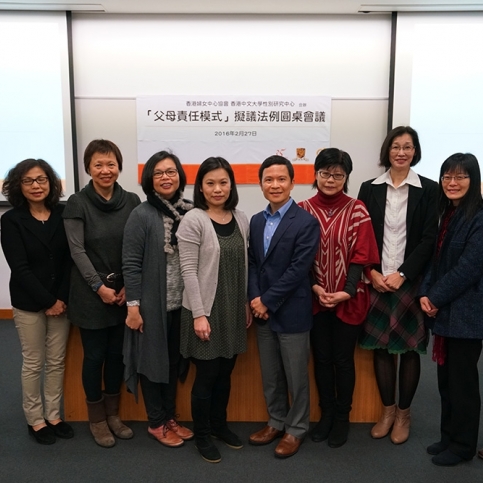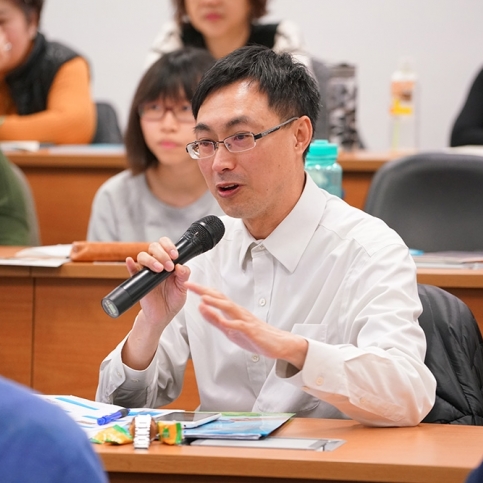In November 2015, the Labour and Welfare Bureau held a public consultation on the proposed legislation with respect to custody and alimony and on proposals set out in the Law Reform Commission's Report on Child Custody and Access Report. The legislation sets out a joint parental responsibility model, which emphasises that, in a divorce, both parents preserve responsibility over their children. The HKFWC agrees with this in principle, but the model also lacks gender perspectives and is not complementary, which is why we oppose the joint parental responsibility model. We organised a roundtable to facility discussions between stakeholders and the LWB. We also attended the Legislative Council public consultation on the proposed legislation on 22 February 2016 to make the voices of women heard.
On 27 February 2016, we co-organised a roundtable with the Gender Research Centre at the Chinese University of Hong Kong on the proposed legislation. Representatives from the Labour and Welfare Bureau joined us for the roundtable to brief us on the consultation. Other roundtable participants included experts from academia, law, and public welfare, as well as our own frontline advocates and sisters in arms from the HKFWC.
During the roundtable, Dr Lau Yuk-king, a CUHK expert in marital relations and divorce, shared some of the challenges and needs facing divorced families. Studies have shown, she said, that there is a strong impact on the self-esteem and emotional development of children in divorces where there is greater contact between former spouses whose relations are highly volatile. Dr Hung Suet-lin of HKBU raised examples from Australia, noting that, from a gender perspective, caution was necessarily due to cases of domestic violence behind closed doors.
Dennis Ho Chi-kuen of the Hong Kong Law Society Family Law Committee, pointed out that legal reforms would help to improve inadequacies in existing legislation. He argued that the joint parental responsibility model could remove the ability for divorced parents to compete for custody arrangements, but he also recognised that there is a need to improve mechanisms for recovering alimony. Cecilia Grace Wong Lai-an, a legal expert in matrimonial litigation, raised concern about the applicability of the proposed legislation to cross-border marriages.
Eva Leung Yee-wah, Executive Director of Jockey Club Lai Kok Centre, shared case studies. Women are faced with gender inequality in their marriages and especially during divorce, she said. She raised concerns about the implementation of the joint parental responsibility model could make post-divorce services, such as divorce education for parents and family mediation and visiting centres, more dangerous to women, who are under overwhelming pressure economically and emotionally in their disadvantageous state.
Finally, Mui Wai-keung of the Hong Kong Council of Social Service acknowledged our concerns, and stated that there was an equally vital need for changes in addition to the legislative reform, including changes in social culture, public policy, and welfare socials.
During the Legislative Council public consultation meeting on 22 February 2016, representatives from the HKFWC expressed our concern with certain provisions of the proposed legislation as well as its enforcement, in particular with respect to unseen domestic violence. The burden of proof, we stated, is placed on the victim, and raised doubts asto whether the persons handling the complaint would have the gender perspective to understand the gender-based power relations.
We also put forward a recommendation with respect to implementation of the legislation, that clear guidelines on handling cases of domestic violence be set. We also recommended establishing adequate visiting and mediation centres, whose staff should maintain a gender perspective in their work. Finally, we proposed that the current alimony and housing arrangement systems be improved so they can be properly coordinated in pace with the legislation.
Wong Lai-yin, a representative from our peer volunteers groups, also made a statement in opposition to the joint parental responsibility model. She raised concerns that putting into practice an ideal notion – that both parents have equal footholds in their relationship -- would neglect the actual power situation between the divorced parties, and noted that, without coordinating measures implement the policy for stakeholders, the reform was a change only in form but not in content, and could even be malicious despite its good intentions.




